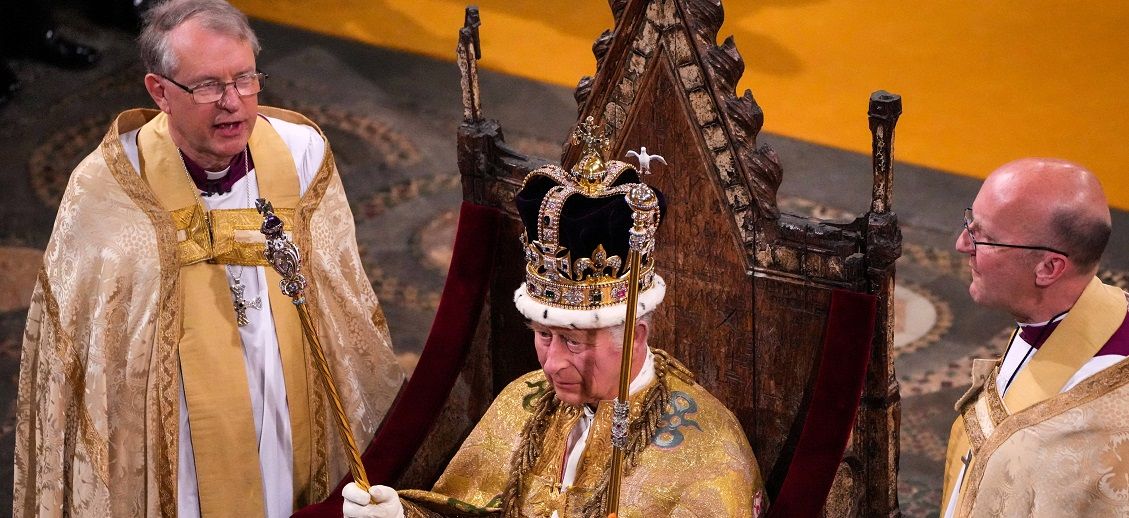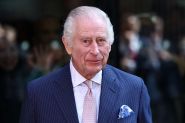- Home
- Middle East
- King Charles III to Read Labour's First Programme in 14 Years

©Britain's King Charles III with the St Edward's Crown on his head attends the Coronation Ceremony inside Westminster Abbey in central London on May 6, 2023. - The set-piece coronation is the first in Britain in 70 years, and only the second in history to be televised. Charles will be the 40th reigning monarch to be crowned at the central London church since King William I in 1066. Outside the UK, he is also king of 14 other Commonwealth countries, including Australia, Canada and New Zealand. Camilla, his second wife, will be crowned queen alongside him and be known as Queen Camilla after the ceremony. (Photo by Aaron Chown / POOL / AFP)
King Charles III will read out Labor's first program for government in a decade and a half on Wednesday when the UK parliament formally reopens following the July 4 election.
Prime Minister Keir Starmer will put turbocharging economic growth at the heart of his legislative plans as Labor runs the UK for the first time in 14 years.
"The legislation set out at the King's Speech will build on the momentum of our first days in office and make a difference to the lives of working people," said Starmer, who led his party to a landslide win over the Conservatives.
Despite its name, the address is not written by the monarch but by the government, which uses it to detail the laws it proposes to make over the next 12 months.
Wearing the diamond-studded Imperial State Crown and a long crimson robe, King Charles will deliver the proposals from a golden throne in the House of Lords upper chamber during a lavish ceremony.
The speech is expected to include more than 35 bills, including measures to enforce public spending rules and others to prevent a repeat of the utility bill price hikes that triggered the UK's recent cost-of-living crisis.
The legislation will also flesh out announcements already made, such as the launching of a fund to draw investment into the UK and of a publicly owned body tasked with boosting clean power by 2030.
Labor is also likely to announce the restoration of mandatory housebuilding targets, plans to renationalize Britain's much-maligned rail services, as well as the opening of recruitment for a new border security command.
A bill to boost workers' rights, including a ban on zero-hour contracts, and strengthened protections for renters are also expected to be included in what will be center-left Labor's first such speech since it was ousted from power in 2010.
Peter Hutchison, with AFP
Prime Minister Keir Starmer will put turbocharging economic growth at the heart of his legislative plans as Labor runs the UK for the first time in 14 years.
"The legislation set out at the King's Speech will build on the momentum of our first days in office and make a difference to the lives of working people," said Starmer, who led his party to a landslide win over the Conservatives.
Despite its name, the address is not written by the monarch but by the government, which uses it to detail the laws it proposes to make over the next 12 months.
Wearing the diamond-studded Imperial State Crown and a long crimson robe, King Charles will deliver the proposals from a golden throne in the House of Lords upper chamber during a lavish ceremony.
The speech is expected to include more than 35 bills, including measures to enforce public spending rules and others to prevent a repeat of the utility bill price hikes that triggered the UK's recent cost-of-living crisis.
The legislation will also flesh out announcements already made, such as the launching of a fund to draw investment into the UK and of a publicly owned body tasked with boosting clean power by 2030.
Labor is also likely to announce the restoration of mandatory housebuilding targets, plans to renationalize Britain's much-maligned rail services, as well as the opening of recruitment for a new border security command.
A bill to boost workers' rights, including a ban on zero-hour contracts, and strengthened protections for renters are also expected to be included in what will be center-left Labor's first such speech since it was ousted from power in 2010.
Peter Hutchison, with AFP
Read more



Comments